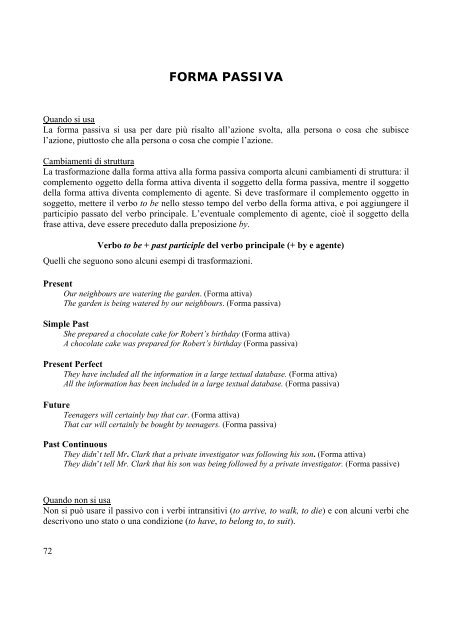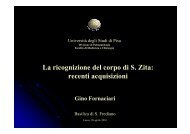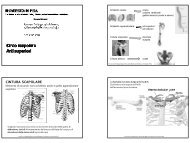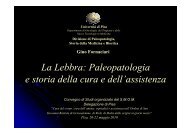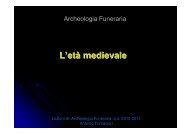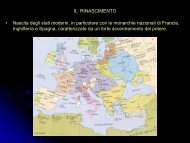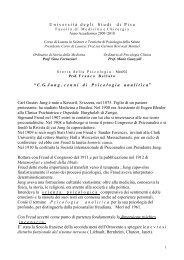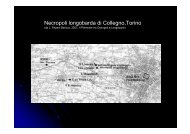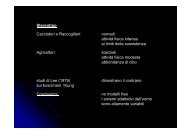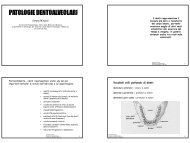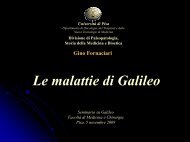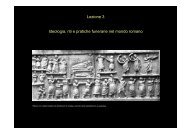Fondamenti della lingua inglese Laura Cignoni - Paleopatologia
Fondamenti della lingua inglese Laura Cignoni - Paleopatologia
Fondamenti della lingua inglese Laura Cignoni - Paleopatologia
Create successful ePaper yourself
Turn your PDF publications into a flip-book with our unique Google optimized e-Paper software.
72<br />
FORMA PASSIVA<br />
Quando si usa<br />
La forma passiva si usa per dare più risalto all’azione svolta, alla persona o cosa che subisce<br />
l’azione, piuttosto che alla persona o cosa che compie l’azione.<br />
Cambiamenti di struttura<br />
La trasformazione dalla forma attiva alla forma passiva comporta alcuni cambiamenti di struttura: il<br />
complemento oggetto <strong>della</strong> forma attiva diventa il soggetto <strong>della</strong> forma passiva, mentre il soggetto<br />
<strong>della</strong> forma attiva diventa complemento di agente. Si deve trasformare il complemento oggetto in<br />
soggetto, mettere il verbo to be nello stesso tempo del verbo <strong>della</strong> forma attiva, e poi aggiungere il<br />
participio passato del verbo principale. L’eventuale complemento di agente, cioè il soggetto <strong>della</strong><br />
frase attiva, deve essere preceduto dalla preposizione by.<br />
Verbo to be + past participle del verbo principale (+ by e agente)<br />
Quelli che seguono sono alcuni esempi di trasformazioni.<br />
Present<br />
Our neighbours are watering the garden. (Forma attiva)<br />
The garden is being watered by our neighbours. (Forma passiva)<br />
Simple Past<br />
She prepared a chocolate cake for Robert’s birthday (Forma attiva)<br />
A chocolate cake was prepared for Robert’s birthday (Forma passiva)<br />
Present Perfect<br />
They have included all the information in a large textual database. (Forma attiva)<br />
All the information has been included in a large textual database. (Forma passiva)<br />
Future<br />
Teenagers will certainly buy that car. (Forma attiva)<br />
That car will certainly be bought by teenagers. (Forma passiva)<br />
Past Continuous<br />
They didn’t tell Mr. Clark that a private investigator was following his son. (Forma attiva)<br />
They didn’t tell Mr. Clark that his son was being followed by a private investigator. (Forma passive)<br />
Quando non si usa<br />
Non si può usare il passivo con i verbi intransitivi (to arrive, to walk, to die) e con alcuni verbi che<br />
descrivono uno stato o una condizione (to have, to belong to, to suit).


